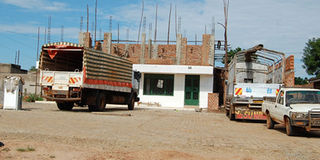Growing sorghum turned around his fortunes

Isiagi shows his commercial building he is setting up with the proceeds from growing sorghum. pHOTOS BY DENNIS EDEMA
What you need to know:
The future looked bleak when he dropped out of school as it meant he could only be a peasant farmer. With the encouragement of a friend, he took a gamble that paid off
Bids of sweat trickle down his face as he takes us across one of the sorghum fields he owns. Along the narrow path as we approach Alex Isiagi’s field, we meet his father. At 92, he moves around like someone a couple of decades younger. Isiagi and his father are some of the sorghum farmers in Kachumbala, Bukedea District.
Isiagi started off as any other subsistence farmer living in a small grass thatched house shared by his entire family. His parents are peasant farmers thus their meagre incomes could not see Isiagi progress in school beyond Senior Six.
Bleak future?
“I dropped out of school in Senior Six while at Mbale S.S,” says the 45-year-old Isiagi.
At that time, the future for him seemed bleak. Back then, joining university seemed like the only story of success.
“I joined my parents in farming. We used to grow cotton and maize on the family land. We used to earn so little from the little yields we were harvesting from my parent’s garden,” he says.
On realising that growing maize and cotton were not yielding much, some of the farmers in the community adopted sorghum as an alternative.
Venture
“A friend, James Michael Ikiso, a businessman in Mbale town encouraged me to try sorghum farming,” Isiagi recalls.
He eventually gave up on the other crops and adopted sorghum in 2004. Within three years, he had realised enough returns to venture into commercial farming.
“The exposure to the partnership between Nile Breweries, Enterprise Uganda and International Fertiliser Development Centre, went a long way in enhancing my venture,” he said.
“With sorghum, we were assured of stable prices from Nile Breweries as they use Epuripur, a type of sorghum used as a raw material in making beer–the Eagle brands. NBL was able to pre-finance me and we developed a good working relationship,” he adds.
Isiagi subsequently gave up on family land and started hiring land. Later on, he was able to buy off most of the land he was hiring before.
Initiative
“I now own 55 acres of land. I use 25 for planting trees and 30 for sorghum farming,” he says. “I am now able to meet all my needs in life. I constructed a house for my parents. Most importantly, my 10 children, four of who are in university, are able to receive the best education I can afford.”
He has also set up the first fuel station in Kachumbala and is currently putting up a storeyed building as well.
Isiagi is chairman of Bukedea Epuripuri Farmers Association Ltd (Befa), an umbrella association for sorghum farmers in Kachumbala Sub-county. T
his was an initiative of Nile Breweries in conjunction with Enterprise Uganda and was formed in 2010.
The association has 350 members, and supports 3,000 farmers and directly employs 40 people.
Progress
“I’ve seen this association grow from using a one-room rental as an office to owning a building, warehouse, processing machine, two tractors and four trucks in just three years. All this is a result of hard work, discipline and resilience,” he says.
“We use our own tools that we have acquired through the savings we contribute as an association to reduce on costs in labour and transport during harvesting period that tends to be expensive. We are also able to get credit owing it to the relationships and trustworthiness we have built with banks.”
On the challenges, Isiagi says weaver birds during the flowering stage of the sorghum are their biggest challenge. “They contribute immensely to losses in production,” he points out.
To deal with the problem,, members allocate themselves to different gardens and chase the birds away. Also, some areas have irregular rainfall patterns, which affect proper growth of the crop.




